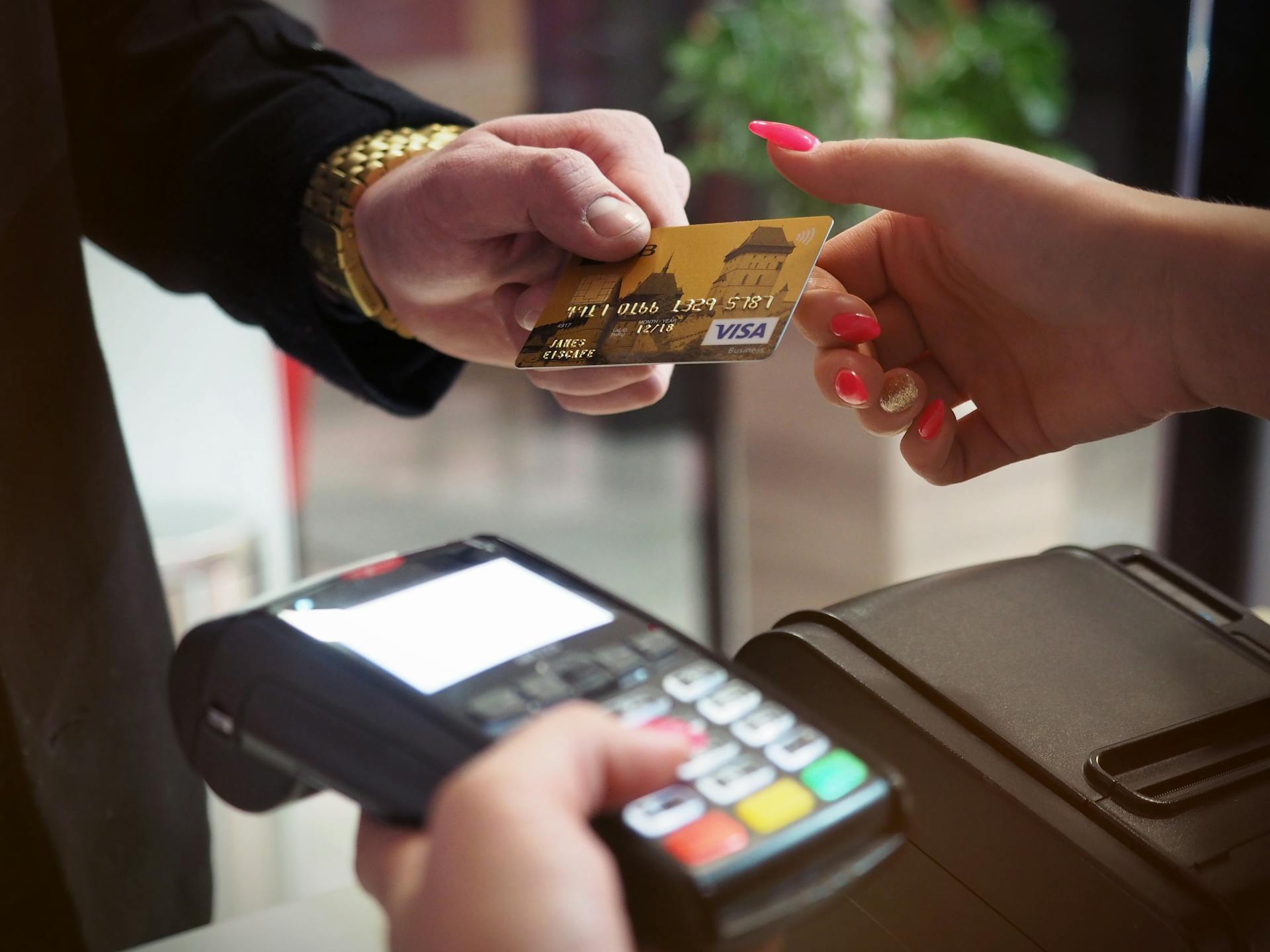
Money transmitter regulations can be complex, but understanding the basics is key to navigating this industry. In the United States, the Financial Crimes Enforcement Network (FinCEN) is the primary regulator of money transmitters.
FinCEN requires money transmitters to register with the agency and obtain a unique identifier, known as a Money Services Business (MSB) ID. This registration is crucial for compliance and anti-money laundering (AML) purposes.
Money transmitters must also comply with various anti-money laundering regulations, including the Bank Secrecy Act (BSA). The BSA requires money transmitters to implement AML programs, report suspicious transactions, and maintain customer due diligence records.
Effective money transmitter regulations help prevent financial crimes and maintain trust in the financial system.
Worth a look: Does Ally Accept Credit Card Payments
Regulatory Requirements
Money transmitters are subject to regulatory oversight and compliance requirements to prevent illicit activities and protect consumers. In the US, they must register with FinCEN, a bureau of the US Department of the Treasury.
Money transmitters must comply with Anti-Money Laundering (AML) regulations, implement robust Know Your Customer (KYC) protocols, and report suspicious transactions. This is to ensure transparency, legality, and security of money transmission activities.

The specific requirements for money transmitters vary depending on the jurisdiction. In the US, they must also register with state-level regulatory authorities and maintain adequate capital reserves.
Money transmitters are typically required to meet certain financial requirements, such as providing audited financial statements and demonstrating adequate capital reserves. They must also maintain a surety bond or other form of financial security to protect customers.
Background checks are often conducted on money transmitters and their key personnel, including owners, officers, and directors. This may involve fingerprinting, criminal record checks, and checks for past regulatory violations or sanctions.
Money transmitters must demonstrate that they have implemented a robust compliance program, including policies and procedures to prevent money laundering and terrorist financing. This involves implementing KYC protocols and policies, transaction monitoring systems, staff training, and diligent reporting of suspicious activities.
Money transmitters are generally required to maintain detailed records of their transactions, customer information, and other relevant documentation. They must adhere to reporting requirements, which may include submitting regular reports to the regulatory authority, such as transaction reports, financial reports, or suspicious activity reports.
For more insights, see: Can You Get Cashback with a Capital One Credit Card

Here is a list of common requirements for money transmitter licenses:
- Registration and application: Money transmitters must register with the appropriate regulatory authority and submit detailed information about the business, its owners, officers, and directors.
- Financial requirements: Money transmitters must meet certain financial requirements, such as providing audited financial statements and demonstrating adequate capital reserves.
- Background checks: Money transmitters and their key personnel must undergo background checks, including fingerprinting, criminal record checks, and checks for past regulatory violations or sanctions.
- Compliance program: Money transmitters must demonstrate that they have implemented a robust compliance program, including policies and procedures to prevent money laundering and terrorist financing.
- Reporting and recordkeeping: Money transmitters must maintain detailed records of their transactions, customer information, and other relevant documentation, and adhere to reporting requirements.
Obtaining a License
Obtaining a money transmitter license can be a complex and time-consuming process. It involves registering with the appropriate regulatory authority, meeting financial requirements, and implementing a robust compliance program.
To start, you'll need to research country-specific regulations and register with the national financial supervisory authority in each country where you plan to operate. This may involve obtaining licenses in multiple states or countries.
The specific requirements for obtaining a money transmitter license can vary significantly depending on the jurisdiction. You may need to provide audited financial statements, demonstrate adequate capital reserves, and maintain a surety bond or other form of financial security.
Here's a step-by-step guide to registering and applying for a money transmitter license:
- Research country-specific regulations
- Register with the authorities
- Secure a bond or other financial security
- Develop an AML compliance program
- Submit the application and supporting documentation
Keep in mind that the application process can take several months or longer to complete, and it's recommended to work with legal and compliance professionals to ensure you meet all necessary requirements.
Payment Processor
A payment processor is a type of service that specializes in processing transactional payments between buyers and sellers. This includes online purchases, point-of-sale (POS) transactions, recurring payments, ecommerce transactions, and payments made with credit cards, debit cards, and digital wallets.
To operate as a payment processor, you'll need to comply with regulatory oversight, which may vary based on jurisdiction and the types of transactions you handle. This includes adhering to data security standards, payment network rules, and other industry regulations.
Payment processors often provide value-added services such as fraud detection and prevention, chargeback management, recurring billing solutions, and detailed transaction reporting. These services can help streamline your business operations and reduce the risk of financial losses.
Here's a breakdown of the types of transactions payment processors typically handle:
- Online purchases
- Point-of-sale (POS) transactions
- Recurring payments
- Ecommerce transactions
- Payments made with credit cards, debit cards, and digital wallets
By understanding the role of a payment processor and the types of transactions they handle, you can make an informed decision about whether this type of service is right for your business.
What License?

So, you're wondering what kind of license you need to obtain? Well, it depends on the activities you plan to engage in as a money transmitter. In many countries, any individual or company that engages in the business of transmitting money needs a money transmitter license.
Selling or issuing payment instruments, such as checks, money orders, or stored value cards, requires a license. Receiving money for transmission, transmitting money, and currency exchange or dealing also need a license.
Banks and credit unions are generally exempt from needing a money transmitter license, as they are already regulated by banking authorities. Government agencies are also exempt when conducting official business.
Certain agents of licensees might be exempt from obtaining their own licenses, but they must operate under the supervision and compliance program of the licensed entity.
Here's a quick rundown of the activities that require a money transmitter license:
- Selling or issuing payment instruments
- Receiving money for transmission
- Transmitting money
- Currency exchange or dealing
- Operating a payment platform
And here are some entities that are generally exempt from needing a money transmitter license:
- Banks and credit unions
- Government agencies
- Certain agents of licensees
Obtaining a License

Obtaining a license to operate as a money transmitter can be a complex and time-consuming process. You'll need to register with the appropriate regulatory authority, which could be at the federal level, such as FinCEN in the US, or at the state level, where most money transmitter licenses are issued.
The specific requirements for obtaining a money transmitter license vary depending on the jurisdiction. You'll need to research country-specific regulations and register with the national financial supervisory authority in each country where you plan to operate. For example, in the US, money transmitters must also obtain licenses in each state where they plan to conduct business.
To get started, you'll need to secure a bond or other financial security, usually in amounts ranging from $50,000 to several million dollars, depending on the jurisdiction and your anticipated business volume. You'll also need to develop an AML compliance program, which includes having policies and procedures in place to prevent money laundering, terrorism financing, and other illicit activities.
A fresh viewpoint: Pc Credit Cards

Here's a step-by-step guide to registering and applying for a money transmitter license:
- Research country-specific regulations: Review the laws, rules, and regulations governing money transmitters in each location where your business operates.
- Register with the authorities: Register with the national financial supervisory authority in each country where you provide services.
- Secure a bond or other financial security: Secure a surety bond or other acceptable form of financial security.
- Develop an AML compliance program: Establish comprehensive policies, procedures, and controls to prevent money laundering, terrorism financing, and other illicit activities.
- Submit the application: Submit the completed application package along with all required supporting documentation and fees to the regulatory agency responsible for overseeing money transmitters.
Note that the specific requirements for obtaining a money transmitter license can vary significantly, depending on the jurisdiction. It's essential to consult the relevant regulatory authorities in your jurisdiction or seek legal advice to understand the specific requirements and processes that you would be subject to.
You might like: American Express Black Centurion Card Requirements
Scope of Services
To obtain a license, it's essential to understand the scope of services offered by Money Services Businesses (MSBs). MSBs provide a range of financial services beyond money transmission.
They may also offer currency exchange services, allowing customers to convert one currency into another. This is a common service offered by many MSBs.
Some MSBs may offer prepaid cards or issue money orders, which are payment instruments similar to checks. Money transmitters are a subset of MSBs and primarily specialize in facilitating the transfer of funds.
You might like: Citi Bank Credit Card Offer
Do I Need a License?

You need a money transmitter license if your business engages in activities like selling payment instruments, receiving money for transmission, or transmitting money. These activities include selling checks, money orders, or stored value cards.
Certain entities are exempt from needing a license, such as banks and credit unions, government agencies, and agents of licensed money transmitters.
To determine if you need a license, you can register with FinCEN or get an exemption. Registering is a relatively simple process, but acquiring a state-level license can be more complex.
Here's a breakdown of the exemptions at the federal level:
- Payment processor exemption
- Agent of the payee exemption
- Authorized delegate exemption
Keep in mind that exemptions are not uniformly available at the state level, so businesses may still need to comply with different state laws.
Service Business
Money service businesses (MSBs) offer a wide range of financial services. They go beyond just money transmission.
MSBs often provide currency exchange services, allowing customers to convert one currency into another. This is a common service offered by MSBs.
Consider reading: Ria Money Transfer Customer Care

Check cashing services are also a common offering from MSBs. They make it possible for customers to cash checks and receive the funds in their hands.
Money transmitters are a subset of MSBs, and their primary focus is on facilitating the transfer of funds. They may not offer additional services like MSBs do.
Some MSBs may offer prepaid cards or issue money orders, which are payment instruments similar to checks. These services are not typically offered by money transmitters.
See what others are reading: Credit Cards That Offer Flashy Rewards like Airline Miles Often
Do I Need a License?
You need a money transmitter license if your business is involved in transmitting money, which includes selling or issuing payment instruments, receiving money for transmission, transmitting money, currency exchange or dealing, and operating a payment platform.
Banks and credit unions are generally exempt from needing a license because they're already regulated by banking authorities.
Government agencies are also exempt when conducting official business, and agents of licensed money transmitters might be exempt if they operate under the supervision and compliance program of the licensed entity.

If your business is an MSB, you must register with FinCEN within 180 days and renew registration every few years to remain compliant with money transmission laws.
You can get an exemption at the federal level if your business falls into one of three categories: payment processor, agent of the payee, and authorized delegate exemption.
Here are some examples of businesses that might qualify for exemptions:
Keep in mind that exemptions might not be uniformly available at the state level, so you should consult a qualified legal counsel to determine how your business model should comply with both state and federal money transmission regulations.
Overview and Process
To become a licensed money transmitter, you'll need to navigate the requirements outlined in Article 13-B of the Banking Law. This involves reviewing Sections 640 to 652-b, as well as Superintendent's Regulations Parts 406, 416, 417, and 300.
The process starts with understanding the necessary information for your annual assessment. You'll need to gather and submit this information accordingly.
Application fees are another crucial aspect of the licensing process. Make sure you're aware of the fees associated with your application.
Fingerprinting is required for DFS, which means you'll need to undergo this process as part of your application.
Expand your knowledge: Money Lender Application
Licensing and Management

To obtain a money transmitter license, you'll need to register with the relevant regulatory authority, such as FinCEN in the US or BaFin in Germany. This involves submitting detailed information about your business, its owners, officers, and directors, as well as any supporting documentation required by the regulatory authority.
Money transmitters are typically required to meet certain financial requirements, including providing audited financial statements, demonstrating adequate capital reserves, and maintaining a surety bond or other form of financial security. The amount of the surety bond can range from $50,000 to several million dollars, depending on the jurisdiction and your anticipated business volume.
To manage your license, you can use the Nationwide Multistate Licensing System and Registry (NMLS), which allows you to create a company record and submit required reports and documents. Current New York State Money Transmitters can transition their licenses to NMLS using the DFS Money Transmitter Transition Checklist.
Here are the key steps to manage your license on NMLS:
- Create a company record in the system
- Submit a form requesting an NMLS account
- Transition your license to NMLS using the DFS Money Transmitter Transition Checklist (for current New York State Money Transmitters)
License Management

License management is a crucial aspect of running a money transmitter business. You need to stay on top of your licenses to avoid any compliance issues.
To manage your license, you can use the Nationwide Multistate Licensing System and Registry (NMLS). The DFS uses NMLS to manage the Money Transmitter License. You can create a company record in the system to gain access.
Each company holding a DFS Money Transmitter License must create a company record in NMLS to manage their license. To do this, you'll need to submit a form requesting an NMLS account. Current New York State Money Transmitters can transition their licenses to NMLS.
Here's a step-by-step guide to managing your license on NMLS:
- Create a company record in NMLS
- Submit a form requesting an NMLS account
- Transition your license to NMLS if you're a current New York State Money Transmitter
Note: The NMLS Resource Center has more information on how to use the system.
Merchant Payment Processor
A Merchant Payment Processor is a company that handles transactions between merchants and banks. They act as a middleman, facilitating the flow of money between parties.

In the US, the Payment Card Industry Data Security Standard (PCI-DSS) applies to all merchants, including those using a Merchant Payment Processor. This standard ensures secure handling of sensitive payment information.
Merchant Payment Processors often charge merchants a fee for their services, which can range from 1.5% to 3.5% of the transaction amount. This fee can add up quickly for high-volume merchants.
Some Merchant Payment Processors, like Stripe, offer online payment processing solutions that integrate seamlessly with e-commerce platforms. This makes it easy for merchants to accept online payments.
In the UK, the Payment Services Regulations 2017 govern the activities of Merchant Payment Processors, ensuring they operate in a fair and transparent manner.
On a similar theme: Merchant Bank Id Credit Card Authorization
Frequently Asked Questions
Is Zelle a money transmitter?
No, Zelle is not a money transmitter, but rather a peer-to-peer payment service that enables direct transfers between bank accounts. It's a convenient alternative to traditional money transfer methods.
How much is a money transmitter license in Florida?
The fee for a Florida money transmitter license is $375. However, additional costs for a surety bond, minimum net worth, and compliance program must also be considered.
Sources
- https://stripe.com/resources/more/what-is-a-money-transmitter
- https://www.fincen.gov/resources/statutes-regulations/administrative-rulings/definition-money-transmitter-merchant-payment
- https://en.wikipedia.org/wiki/Money_transmitter
- https://www.dfs.ny.gov/apps_and_licensing/money_transmitters
- https://www.moderntreasury.com/learn/what-is-money-transmission
Featured Images: pexels.com

